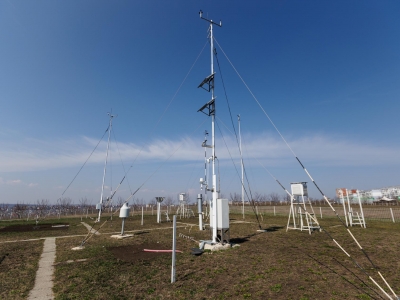NAP-2: Advancing Moldova’s National Climate Change Adaptation Planning process
Project Overview
Funded by the Green Climate Fund (GCF) Readiness Programme, the "NAP-2: Advancing Moldova’s National Climate Change Adaptation Planning Process" project is supporting the Government of Moldova to develop the country’s national development plan for climate change adaptation. The project aims to 1) strengthen and operationalize the national steering mechanism for climate change adaptation, 2) improve the long-term capacity for planning and implementation of adaptation actions through CCA technologies; and 3) improve the mainstreaming of climate change adaptation in priority sectors through the increased alignment of national development priorities.
The project aims to address the barriers to prioritizing national investments in climate change adaptation and increase the human and financial capacity for the implementation of the priority actions identified during the NAP-1 project, including those that will emerge under this NAP-2 initiative. To accomplish this overall goal, the project activities have been designed to address the gaps and barriers also identified in the NAP-1 and the Stocktaking Report. Through the NAP process, Moldova is realizing a long-term paradigm shift towards climate resilience in its national and sectoral development planning.
Project Details
The Government of Moldova sees the National Adaptation Planning (NAP) process as a key to achieving the adaptation objectives outlined in its 2014 Climate Change Adaptation Strategy and its Nationally Determined Contributions (NDC), as well as the continued mainstreaming of climate change considerations into its policies and budgeting processes. The NAP process was launched in 2014 through consultations with national stakeholders with the support of the Austrian Development Agency (ADA) and UNDP.
Over the last decade, the Republic of Moldova has experienced several extreme events, such as droughts and major floods. These events, coupled with the gradual impacts of rising average temperatures and uneven precipitation patterns throughout the year, have adversely affected the country's economy and the well-being and health of its population. Severe droughts are recurring more frequently causing significant economic losses. In 2007 and 2012, droughts resulted in estimated losses of approximately USD 1 billion and USD 400 million, affecting 80% of the rural population. Meanwhile, flood damages in 2008 and 2010 are estimated at around USD 120 million and USD 42 million, respectively. Climate projections suggest a continued rise in average temperatures and an additional 12 days with zero precipitation, posing ongoing challenges for the country.
In addition to the key implementing partner, the Ministry of Environment, other project partners include the Ministry of Infrastructure and Regional Development, Ministry of Energy, Ministry of Finance, Ministry of Health, and the National Commission on Climate Change.
Expected results:
- National Climate Change Adaptation Strategy updated with the NAP-2 overarching goal and sector-specific adaptation objectives articulated in the Climate Change Adaptation Action Plans of health and forestry sectors, and in the Development Action Plans of the transport, energy and building sectors.
- Monitoring and Evaluation system with improved data analysis to support decision-making developed.
- Climate Change Adaptation Capacity Development Plan updated and adopted by the five key sectors.
- Climate change information and knowledge management portal that supports the NAP process and mainstreaming of climate change adaptation considerations launched.
- Adaptation Plans for seven district towns developed.
- Technology Roadmap for each key sector (transport, energy, water, forestry and health) developed based on Technology Needs Assessment.
- 5 investment project ideas developed to be submitted to Green Climate Fund.
Project updates
The NAP-2 project actively engages with the Minister of Environment and key stakeholders, facilitating ongoing discussions on project activities, accomplishments, and challenges. Recognizing the need for a coordinated approach to climate change activities, the Ministry of Environment requested an analysis of the existing regulatory framework, aiming to identify gaps and propose operational coordination mechanisms. This effort has involved exploring options to upgrade the National Commission on Climate Change (NCCC), with potential integration with other bodies such as the National Council on Sustainable Development or the National Commission on Emergency Situations.
The National Climate Change Adaptation Programme (NCCAP) until 2030 and its Action Plan, approved by the Government on 30 August 2023, has been developed in a participatory manner that supports the alignment of the national adaptation goals with the aims of the Paris Agreement in transport, energy, water, forest, and health sectors. Guidelines and tools for conducting Climate Change Impact, Vulnerability, and Risk Assessments (CCIVRA) at sector and organization levels have been developed. The project has ensured that these tools are not only comprehensive but also user-friendly. Additionally, a Monitoring and Evaluation (M&E) framework for the NAP process has been devised.
The project has delivered the Climate Change Capacity Development Plan (CDP) which lays the foundation for strengthening institutional capacities to mainstream climate change considerations into sectorial policies and implementation of the policies. This has involved consultations to define sector-specific adaptation targets and integrating them into sectorial development plans. In addition, the Climate Change Knowledge Management Roadmapwas developed which provides a better understanding of the national capacities needed to produce, collect, and use climate change information and knowledge. This forms the foundation for the Climate Change Information and Knowledge Management Platform, a one-stop shop for all climate-related information under development.
The project has supported the assessment of the meteorological and hydrological network which enabled the State Hydro-meteorological Service of Moldova (SHS) to seek further support from Sweden, World Bank and Meteo-France International in terms of data digitalization and improving meteorological and hydrological monitoring. Market research was finalized for the introduction of new climate services and increasing awareness of the importance of hydrometeorological and climate services. Moreover, the SHS has developed the Law and Regulation on hydrometeorological activity and methodology for calculating tariffs for climate services.
Regarding the technology needs assessment (TNA), the ‘Identification and prioritization of adaptation sectoral technologies’ and ‘the Barrier Analysis and Enabling Framework of TNA analysis’ were conducted involving relevant stakeholders from the five priority sector Working Groups (water, transport, energy, forestry, health). As a result, 115 technology fact sheets (TFS) as well as elaborated versions of the 53 TFS were produced and measures to overcome barriers were identified.
Other recent activities have included further consultations on improving coordination mechanisms, creating a training curriculum and master's course on climate change adaptation in the health sector, and developing the NAP-3 project document, including a roadmap and financing plan. Furthermore, other activities have involved training, data collection methodologies, aligning national codes with EU standards, and supporting the Ministry of Infrastructure and Regional Development with construction standards/codes for at-risk assets in the transport and construction sectors.
News
Key Results and Outputs
The project objectives will be achieved through three outcomes, focusing on strengthening national capacities for mainstreaming climate change adaptation considerations, producing actionable climate risks and vulnerability assessments, and implementing effective methods, tools, and information systems to better inform decision-making on climate risks. The three outcomes build on each other in a progressive and interrelated approach that strengthens the national conditions for adaptation.
Outcome 1: National steering mechanism for climate change adaptation strengthened and operationalized
Outcome 2: Long-term capacity on planning and implementation of adaptation actions improved
Outcome 3: Mainstreaming of climate change adaptation is improved through the increased alignment of national development priorities, in the priority sectors (forestry, health, energy and transport).

 In Moldova, hydrometeorological services are modernising - and becoming more accessible to the general population
In Moldova, hydrometeorological services are modernising - and becoming more accessible to the general population